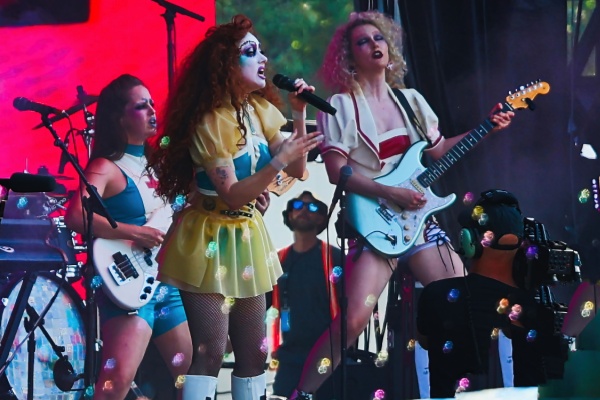In recent years, high-profile artists like Adele, Rihanna, and The Rolling Stones have all canceled shows—often at great financial cost—due to overwhelming health concerns. Now, Chappell Roan joins the growing list of performers who have had to take a step back from touring, canceling two shows just one day before they were set to happen. Her reason? Feeling “overwhelmed” and in need of a break. It’s a story becoming all too common in the music industry, raising the question: what more can be done to prevent these last-minute cancellations?
Why Mental and Physical Health is a Bigger Issue Than Ever
Artists canceling shows due to health reasons isn’t new, but the nature of the health concerns has shifted. While sickness is inevitable, many artists point to more complex factors—mental health struggles, vocal fatigue, and performance anxiety—as reasons for stepping back. The pressure to constantly perform, promote, and maintain a public presence creates an environment ripe for exhaustion, illness, and mental strain. Despite increased investment in mental health programs, the problem persists, particularly for emerging artists who are being pushed harder than ever.
Take Chappell Roan’s recent tour schedule: performing in three different cities on consecutive nights. Such a grueling itinerary is a recipe for burnout, especially for newer artists experiencing the meteoric rise in fame that Roan has. Constant travel and non-stop performances leave little time for recovery, and that’s when health problems—both physical and mental—start to surface. “I want to be present when I perform and give the best shows possible,” Roan said, emphasizing that her exhaustion was preventing her from delivering the quality performances she aims for.
The Body is the Instrument
For singers, their body is their instrument, and any physical or mental strain impacts their performance. Tiredness, stress, and vocal fatigue show up in their voice, resulting in tightness, an inability to hit high notes, or even complete vocal failure. With social media’s hyper-critical lens, artists are under more pressure than ever. A single bad performance can be instantly shared and scrutinized, leading to an avalanche of stress and anxiety. As such, artists need to be properly supported to ensure their voices and mental health are protected.
No artist wants to go onstage feeling they might falter, but when touring schedules are packed with little time to rest, it’s inevitable. And it’s not just the performances that take a toll—interviews, promotional appearances, and travel days all eat into what should be downtime for the artist. These additional tasks can leave artists with little or no opportunity to recharge.
The Industry Needs to Change
So, how can the music industry address these issues and prevent cancellations like Chappell Roan’s? Firstly, executives and management teams need to rethink how they schedule tours. Rather than cramming as many shows as possible into a short time frame, they should collaborate with artists to create a balanced workload that allows adequate recovery time. This includes recognizing that promotional activities are also taxing on an artist’s voice and body and shouldn’t be slotted into so-called “off days.” Travel, too, needs to be considered, as it can be just as exhausting as a performance itself.
Many established artists already demand recovery time in their contracts, but for newer acts, it’s much harder to speak up. Tour profitability often takes time, and rising costs—especially in the post-pandemic world—make it even tougher to justify extra days off. However, taking a long-term view is key. Tour cancellations come with hefty financial penalties and can harm the trust between artists and fans, so allowing time for recovery can be a smarter, more sustainable option.
Training for the Pressure of Performance
Another area where the industry can improve is offering proper training to help artists handle the pressure of performing. Classical musicians have long known the importance of managing performance anxiety, and many conservatories now provide mental skills training, including virtual reality simulations to help students cope with high-stakes performances. In the pop world, however, performance psychology is still rarely discussed, even though researchers compare the stress of live performance to the experience of skydiving.
Without proper management of stress and anxiety, artists may suffer from long-term health issues. This is why it’s crucial for all performers to have routines to prepare for and recover from shows, similar to how athletes manage their bodies. Incorporating these techniques into pop music could drastically reduce the overwhelming stress artists face on tour.
Routine Health Check-Ins for Artists
Another potential solution is the implementation of routine performance health check-ins. These assessments could monitor vocal health, mental well-being, and physical issues, helping artists catch problems early before they escalate into chronic conditions that can be career-threatening. Musicians often delay seeking help for health issues, and a standardized offer of support across the industry would be a preventative step in avoiding burnout and long-term problems.
Looking Toward a More Sustainable Future
While much progress has been made in addressing artist health in recent years, Chappell Roan’s canceled shows—and the cancellations by other artists before her—reveal that there are still significant gaps in the support provided to performers. If the industry wants to move toward a more sustainable, ethical future, it must prioritize the well-being of its artists, starting with smarter scheduling, better mental health resources, and comprehensive performance health management.
By addressing these issues, the music industry can help reduce the need for last-minute cancellations and support artists in doing what they love most: sharing their music with the world.
—
Photo Credit: L Paul Mann / Shutterstock.com
